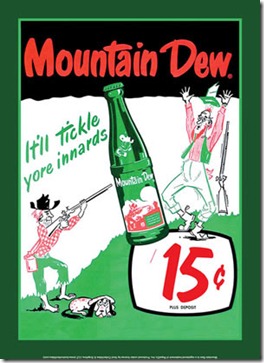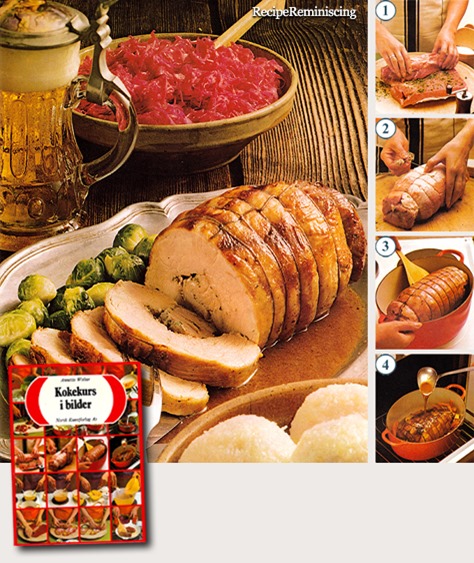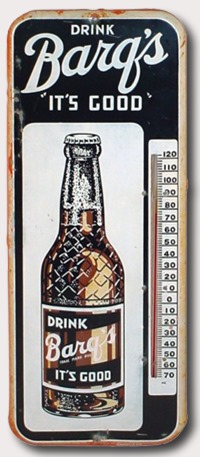Mountain Dew (currently stylized as MTN Dew) is a citrus-flavored carbonated soft drink brand produced and owned by PepsiCo. The original formula was invented in the 1940s by two Tennessee beverage bottlers, Barney and Ally Hartman, and was first marketed in Marion, VA, Knoxville and Johnson City, Tennessee. A revised formula was created by Bill Bridgforth in 1958. The Mountain Dew brand and production rights were acquired by the Pepsi-Cola company in 1964, at which point its distribution expanded more widely across the United States.

Between the 1940s and 1980s, Mountain Dew consisted of a single Citrus-flavored version. Diet Mountain Dew was introduced in 1988, followed by Mountain Dew Red which was introduced – and discontinued – in 1988. While Mountain Dew Red was short-lived, it represented the beginning of a long-term trend of Mountain Dew being produced in different flavour variations. This product line extension trend has continued in the 2000s, with expansion into specialty, limited time production, and retailer-specific (Taco Bell, 7-Eleven) variations of Mountain Dew.
Production was first extended to the U.K. in 1996, though this initial debut was short-lived as it was phased out in 1998. The product returned to the U.K. under the name "Mountain Dew Energy" in 2010 and returned to the Republic of Ireland in Spring 2011. As of 2009, Mountain Dew represented a 6.7 percent share of the overall carbonated soft drinks market in the U.S. Its competition includes Vault, Mello Yello, and Sun Drop; Mountain Dew accounts for 80 percent of citrus soft drinks sold within the U.S.
Packaging
The name “Mountain Dew” was first trademarked by Ally and Barney Hartman in the 1940s, who coined the name from a colloquial term for moonshine whiskey. Early bottles and signage carried the reference forward by showing a cartoon-stylized mountaineer. The first sketches of the original Mountain Dew bottle labels were devised in 1948 by John Brichetto, and the representation on product packaging has changed at multiple points in the history of the beverage.
 PepsiCo (known then as The Pepsi-Cola Company) acquired the Mountain Dew brand in 1964, and shortly thereafter in 1973 the logo was modified as the company sought to shift its focus to a “younger, outdoorsy” generation. This direction continued as the logo remained the same through the 1970s, 80s and into the late 1990s. Later updates to the logo were made in 1999 and again in 2005. On October 15, 2008, the Mountain Dew logo was redesigned to "Mtn Dew" within the U.S. market, as a result of a PepsiCo rebranding of its core carbonated soft-drink products. However, the variant flavours continued to use the previous design until May 2011, when it was revealed that the "Code Red", "LiveWire", "Voltage", and "Baja Blast" flavour variants would be given redesigned packaging, including new logos to correspond with the "Mtn Dew" style. The returning flavours "Pitch Black" "Supernova" and "Typhoon" were given redesigned packaging and logos for their re-release.
PepsiCo (known then as The Pepsi-Cola Company) acquired the Mountain Dew brand in 1964, and shortly thereafter in 1973 the logo was modified as the company sought to shift its focus to a “younger, outdoorsy” generation. This direction continued as the logo remained the same through the 1970s, 80s and into the late 1990s. Later updates to the logo were made in 1999 and again in 2005. On October 15, 2008, the Mountain Dew logo was redesigned to "Mtn Dew" within the U.S. market, as a result of a PepsiCo rebranding of its core carbonated soft-drink products. However, the variant flavours continued to use the previous design until May 2011, when it was revealed that the "Code Red", "LiveWire", "Voltage", and "Baja Blast" flavour variants would be given redesigned packaging, including new logos to correspond with the "Mtn Dew" style. The returning flavours "Pitch Black" "Supernova" and "Typhoon" were given redesigned packaging and logos for their re-release.
Ingredients
In its primary market of the United States, the ingredient composition of Mountain Dew is listed as: “carbonated water, High-fructose corn syrup (in much of the U.S.), concentrated orange juice, citric acid, natural flavours, sodium benzoate, caffeine, sodium citrate, erythorbic acid, gum arabic,calcium disodium EDTA, brominated vegetable oil, and yellow 5.” The ingredient makeup of Mountain Dew varies based on the country of production. For example, in Canada, the sweetener listed is "fructose/sucrose" and it is caffeine-free by default.
 In response to consumer insistence on a more natural product, PepsiCo in 2009 released a limited run production of Mountain Dew Throwback, a variation consisting of sugar in place of high fructose corn syrup. Mountain Dew Throwback has since been re-released for brief periods (generally 8–12 weeks at a time), including a 2nd wave from December 2009 – February 2010 and a 3rd wave in Summer/Fall 2010. A 4th limited production run began in March 2011, lasting for a total of eight weeks before becoming a permanent addition to the Mountain Dew flavour line-up.
In response to consumer insistence on a more natural product, PepsiCo in 2009 released a limited run production of Mountain Dew Throwback, a variation consisting of sugar in place of high fructose corn syrup. Mountain Dew Throwback has since been re-released for brief periods (generally 8–12 weeks at a time), including a 2nd wave from December 2009 – February 2010 and a 3rd wave in Summer/Fall 2010. A 4th limited production run began in March 2011, lasting for a total of eight weeks before becoming a permanent addition to the Mountain Dew flavour line-up.
Two unfounded urban legends about Mountain Dew ingredients exist. One is that it causes shrunken testicles and/or penis size. The other is that it lowers sperm count. Both myths are typically attributed to the dye Yellow #5 (tartrazine). Yellow #5 has never been scientifically linked to any of the alleged effects in the legends; nor has any other component of the drink. Thus, there is no evidence that Mountain Dew is any more hazardous (or beneficial) to health than other caffeinated, sugar-sweetened soft drinks, provided one is not allergic to Yellow #5.
Text from Wikipedia, the free encyclopedia

 Cream Porridge is an old tradition for various occasions in Bamble in Telemark. It was for example used when haying was finished and everything was safely brought inside. Then all the farm people would gathered for haying porridge. Furthermore, it has been a long tradition to eat cream porridge at midsummer. Then the porridge was decorated with birch leaves. In earlier times, it was also common for cream porridge to be brought as maternity porridge after a childbirth.
Cream Porridge is an old tradition for various occasions in Bamble in Telemark. It was for example used when haying was finished and everything was safely brought inside. Then all the farm people would gathered for haying porridge. Furthermore, it has been a long tradition to eat cream porridge at midsummer. Then the porridge was decorated with birch leaves. In earlier times, it was also common for cream porridge to be brought as maternity porridge after a childbirth.
![the-weekend-social-badge-small-msp-1_thumb[1] the-weekend-social-badge-small-msp-1_thumb[1]](https://recipereminiscing.files.wordpress.com/2014/06/the-weekend-social-badge-small-msp-1_thumb1_thumb.png?w=100&h=100)
![TuesdaysTable copy[5] TuesdaysTable copy[5]](https://recipereminiscing.files.wordpress.com/2014/06/tuesdaystable-copy51.jpg?w=100&h=100)
![go lo yok_post_thumb[2] go lo yok_post_thumb[2]](https://recipereminiscing.files.wordpress.com/2014/06/go-lo-yok_post_thumb2_thumb.jpg?w=474&h=673)












![karamellpudding_post_thumb[2] karamellpudding_post_thumb[2]](https://recipereminiscing.files.wordpress.com/2014/06/karamellpudding_post_thumb2_thumb.jpg?w=474&h=468)


![Tickle My Tastebuds Tuesday[4] Tickle My Tastebuds Tuesday[4]](https://recipereminiscing.files.wordpress.com/2014/06/tickle-my-tastebuds-tuesday41.jpg?w=100&h=100)


![ingemaakte kerrievis_post_thumb[2] ingemaakte kerrievis_post_thumb[2]](https://recipereminiscing.files.wordpress.com/2014/06/ingemaakte-kerrievis_post_thumb2_thumb.jpg?w=474&h=599)
![Treasure Box Tuesday[4] Treasure Box Tuesday[4]](https://recipereminiscing.files.wordpress.com/2014/06/treasure-box-tuesday4.jpg?w=100&h=99)
![chocolate iced layer cake_page_thumb[6] chocolate iced layer cake_page_thumb[6]](https://recipereminiscing.files.wordpress.com/2014/06/chocolate-iced-layer-cake_page_thumb6_thumb.jpg?w=474&h=401)
![the-yuck-stops-here-symbol-02[5] the-yuck-stops-here-symbol-02[5]](https://recipereminiscing.files.wordpress.com/2014/06/the-yuck-stops-here-symbol-025.jpg?w=100&h=100)
![veal cacciatore_post_thumb[2] veal cacciatore_post_thumb[2]](https://recipereminiscing.files.wordpress.com/2014/06/veal-cacciatore_post_thumb2_thumb.jpg?w=474&h=661)



![portvinskylling_post_thumb[2] portvinskylling_post_thumb[2]](https://recipereminiscing.files.wordpress.com/2014/06/portvinskylling_post_thumb2_thumb.jpg?w=474&h=702)



![raisin cocanut pudding - brown betty_post_thumb[2] raisin cocanut pudding - brown betty_post_thumb[2]](https://recipereminiscing.files.wordpress.com/2014/06/raisin-cocanut-pudding-brown-betty_post_thumb2_thumb.jpg?w=474&h=508)








